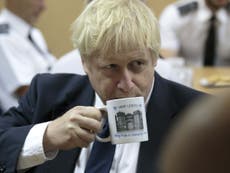I’ve been talking to Brussels insiders and this is what they told me about a no-deal Brexit
Even if Johnson took the UK out without a deal, he would soon come calling for his free trade agreement – and be presented with May’s deal once again

Is Boris Johnson serious about getting a Brexit deal, or is he now locked into a no-deal strategy? Despite the euphoria about a US-UK trade agreement, fuelled by the London visit of Donald Trump’s national security adviser John Bolton, Johnson pointed out that the UK’s single biggest deal would be with “our friends and partners over the Channel”.
It didn’t buy him much time. Philip Hammond, the former chancellor, returned to the fray today, accusing Boris of “wrecking” any hopes of securing a revised Brexit deal by demanding the EU abolish the Irish backstop. Hammond is among 20 senior Tories to warn Johnson in a letter that he has “set the bar so high that there is no realistic possibility of a deal being done”.
This week I’ve been talking to officials in London and Brussels about the prospects of a deal. On the face of it, Hammond is right. The UK and EU remain in parallel universes, with no real dialogue since Johnson became PM; both sides restate their positions and refuse to blink. “It’s like ships passing in the night,” was how one EU source put it.
EU officials have noticed a very different approach since Team Boris took over from Theresa May’s negotiators. May tried to protect the economy by preserving frictionless trade with the EU; signing up to the backstop was one of the trade-offs. A big clue to Johnson’s current strategy came in a leaked private speech in June last year, in which he attacked the Treasury, saying: “What they don’t want is friction at the borders. They don’t want any disruption of the economy. So they’re sacrificing all the medium and long-term gains out of fear of short-term disruption.”
This goes to the heart of the matter: Boris was – and is – prepared to take some short-term economic pain for what he considers to be the long-term gain.
The other clue to his approach came during the Tory leadership contest, when he argued that May was wrong to address the Irish border question in the withdrawal agreement, saying it should be resolved as part of the long-term trade deal. He does not feel bound by May’s deal. The trouble is that, in the EU’s eyes, it has negotiated an agreement with the UK that includes the backstop and so is loath to revisit the issue.
There’s another reason: as Hammond warned today, the EU27’s fragile unity could “collapse” if it reopened the agreement. Even if Johnson took the UK out without a deal, the EU calculates, he would soon come calling for his free trade agreement, when he will be presented with... May’s withdrawal agreement, backstop included.
Johnson’s allies insist a deal is still possible. As one put it: “We had to go hard on no deal at the outset, to show the EU we are serious. But the PM wants a deal. We think the penny has now dropped in Brussels.”
It has, but that doesn’t mean the EU will back down.
Like the UK, the EU is better prepared for a no-deal Brexit than it was before the original March leaving date. Yes, the EU worries about the impact on the island of Ireland and knows that, as one official said, “Boris will play the blame game, and blame us.”
There is still time – just – for both sides to stop sniping and start talking. Johnson will make his debut on the world leaders’ stage at the G7 summit in Biarritz on 24-26 August. He could easily allow his talks in the margins with EU leaders to be trumped by his first meeting as prime minister with Donald Trump. But that would be a pity. Angela Merkel and Emmanuel Macron will be there, as will Jean-Claude Juncker, the European Commission president. Boris is considering whether to visit Berlin and Paris for talks before the summit, which could oil the wheels. He should go.
There is a way to break the deadlock, a trade-off that might just create a window for some real negotiations: Johnson should drop his refusal to talk until the EU scraps the backstop; in return, the EU should drop its refusal to reopen the withdrawal agreement.
Although both camps say they want to avoid no deal, they may decide to play it long and make no progress in Biarritz. The EU might not move until it assesses whether parliament will block no deal when MPs return next month.
That would be leaving it dangerously late.
It’s in Johnson’s self-interest to prove he wants a deal by at least trying to get one. Although some of his advisers now regard Brexit as synonymous with no deal, that is not what the often cited “17.4 million” voted for in the 2016 referendum.
Boris should remember that four in 10 voters who backed the Tories in 2015 supported Remain the following year, an estimated four million people. What happened at the 2015 election? The Tories won an overall majority.
Johnson never mentions the 48 per cent, but he will need the support of some of them in the election that is probably coming sooner rather than later.



Join our commenting forum
Join thought-provoking conversations, follow other Independent readers and see their replies